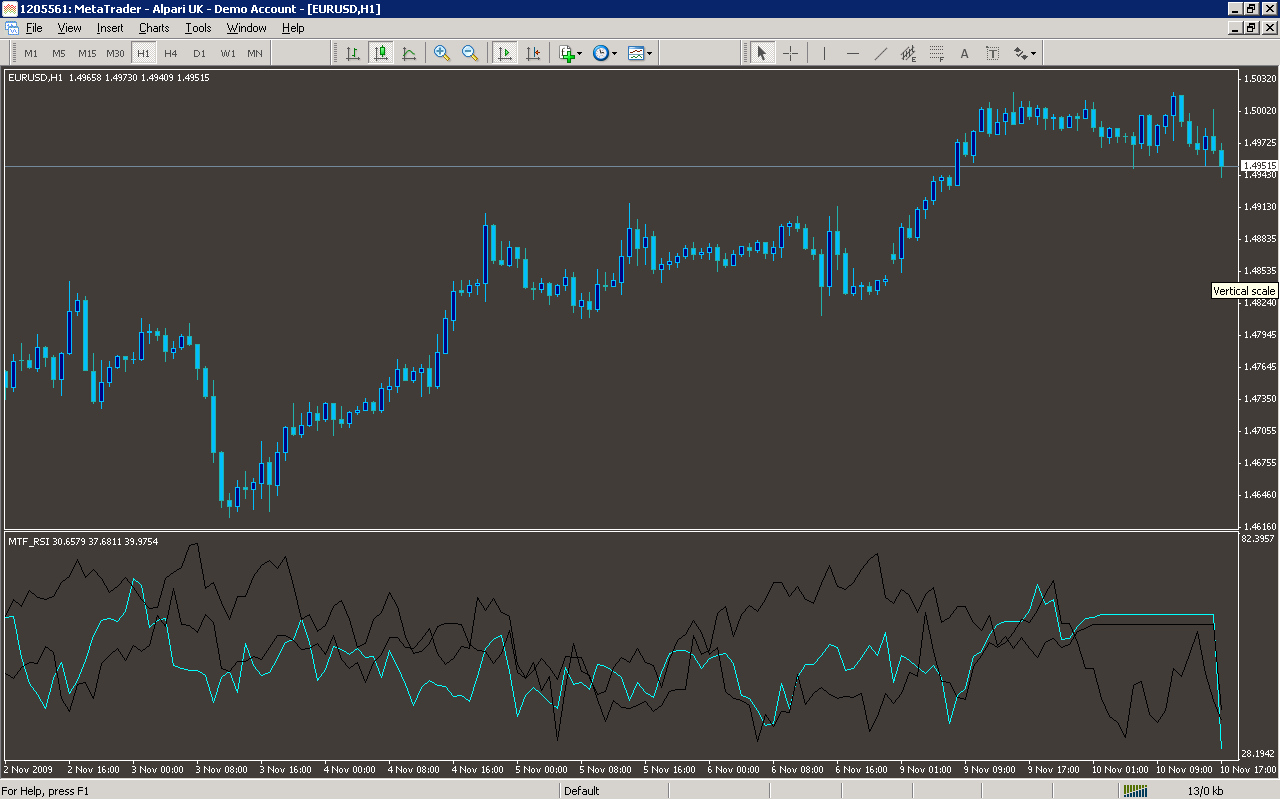//+------------------------------------------------------------------+
//| MTF_RSI.mq4 |
//| Copyright © 2006, Keris2112 |
//| recoded by FOREXflash |
//+------------------------------------------------------------------+
#property copyright "Copyright © 2006, Keris2112, recoded by FOREXflash 2009."
#property link "http://www.forex-tsd.com"
#property indicator_separate_window
#property indicator_buffers 3
#property indicator_color1 Blue
#property indicator_color2 Red
#property indicator_color3 Yellow
#property indicator_level1 50
#property indicator_minimum 0
#property indicator_maximum 100
//---- input parameters
/*************************************************************************
PERIOD_M1 1
PERIOD_M5 5
PERIOD_M15 15
PERIOD_M30 30
PERIOD_H1 60
PERIOD_H4 240
PERIOD_D1 1440
PERIOD_W1 10080
PERIOD_MN1 43200
You must use the numeric value of the timeframe that you want to use
when you set the TimeFrame' value with the indicator inputs.
---------------------------------------
PRICE_CLOSE 0 Close price.
PRICE_OPEN 1 Open price.
PRICE_HIGH 2 High price.
PRICE_LOW 3 Low price.
PRICE_MEDIAN 4 Median price, (high+low)/2.
PRICE_TYPICAL 5 Typical price, (high+low+close)/3.
PRICE_WEIGHTED 6 Weighted close price, (high+low+close+close)/4.
You must use the numeric value of the Applied Price that you want to use
when you set the 'applied_price' value with the indicator inputs.
**************************************************************************/
extern string _____RSI_TF1_____;
extern int TimeFrame1=5;
extern int RSIperiod1=14;
extern int applied_price1=0;
extern string _____RSI_TF2_____;
extern int TimeFrame2=15;
extern int RSIperiod2=14;
extern int applied_price2=0;
extern string _____RSI_TF3_____;
extern int TimeFrame3=30;
extern int RSIperiod3=14;
extern int applied_price3=0;
double ExtMapBuffer1[];
double ExtMapBuffer2[];
double ExtMapBuffer3[];
//+------------------------------------------------------------------+
//| Custom indicator initialization function |
//+------------------------------------------------------------------+
int init()
{
//---- indicator line
SetIndexBuffer(0,ExtMapBuffer1);
SetIndexStyle(0,DRAW_LINE);
switch(TimeFrame1)
{
case 1 : string TimeFrameStr1="Period_M1"; break;
case 5 : TimeFrameStr1="Period_M5"; break;
case 15 : TimeFrameStr1="Period_M15"; break;
case 30 : TimeFrameStr1="Period_M30"; break;
case 60 : TimeFrameStr1="Period_H1"; break;
case 240 : TimeFrameStr1="Period_H4"; break;
case 1440 : TimeFrameStr1="Period_D1"; break;
case 10080 : TimeFrameStr1="Period_W1"; break;
case 43200 : TimeFrameStr1="Period_MN1"; break;
default : TimeFrameStr1="Current Timeframe";
}
SetIndexBuffer(1,ExtMapBuffer2);
SetIndexStyle(1,DRAW_LINE);
switch(TimeFrame2)
{
case 1 : string TimeFrameStr2="Period_M1"; break;
case 5 : TimeFrameStr2="Period_M5"; break;
case 15 : TimeFrameStr2="Period_M15"; break;
case 30 : TimeFrameStr2="Period_M30"; break;
case 60 : TimeFrameStr2="Period_H1"; break;
case 240 : TimeFrameStr2="Period_H4"; break;
case 1440 : TimeFrameStr2="Period_D1"; break;
case 10080 : TimeFrameStr2="Period_W1"; break;
case 43200 : TimeFrameStr2="Period_MN1"; break;
default : TimeFrameStr2="Current Timeframe";
}
SetIndexBuffer(2,ExtMapBuffer3);
SetIndexStyle(2,DRAW_LINE);
switch(TimeFrame3)
{
case 1 : string TimeFrameStr3="Period_M1"; break;
case 5 : TimeFrameStr3="Period_M5"; break;
case 15 : TimeFrameStr3="Period_M15"; break;
case 30 : TimeFrameStr3="Period_M30"; break;
case 60 : TimeFrameStr3="Period_H1"; break;
case 240 : TimeFrameStr3="Period_H4"; break;
case 1440 : TimeFrameStr3="Period_D1"; break;
case 10080 : TimeFrameStr3="Period_W1"; break;
case 43200 : TimeFrameStr3="Period_MN1"; break;
default : TimeFrameStr3="Current Timeframe";
}
IndicatorShortName("MTF_RSI");
}
//----
return(0);
//+------------------------------------------------------------------+
//| MTF RSI |
//+------------------------------------------------------------------+
int start()
{
start2();
start3();
datetime TimeArray1[];
int i,limit,y=0,counted_bars=IndicatorCounted();
// Plot defined time frame on to current time frame
ArrayCopySeries(TimeArray1,MODE_TIME,Symbol(),TimeFrame1);
limit=Bars-counted_bars;
for(i=0,y=0;i<limit;i++)
{
if (Time[i]<TimeArray1[y]) y++;
/***********************************************************
Add your main indicator loop below. You can reference an existing
indicator with its iName or iCustom.
Rule 1: Add extern inputs above for all neccesary values
Rule 2: Use 'TimeFrame' for the indicator time frame
Rule 3: Use 'y' for your indicator's shift value
**********************************************************/
ExtMapBuffer1[i]=iRSI(NULL,TimeFrame1,RSIperiod1,applied_price1,y) ;
}
return(0);
}
//+------------------------------------------------------------------+
//| MTF RSI |
//+------------------------------------------------------------------+
int start2()
{
datetime TimeArray2[];
int i,limit,y=0,counted_bars=IndicatorCounted();
// Plot defined time frame on to current time frame
ArrayCopySeries(TimeArray2,MODE_TIME,Symbol(),TimeFrame2);
limit=Bars-counted_bars;
for(i=0,y=0;i<limit;i++)
{
if (Time[i]<TimeArray2[y]) y++;
/***********************************************************
Add your main indicator loop below. You can reference an existing
indicator with its iName or iCustom.
Rule 1: Add extern inputs above for all neccesary values
Rule 2: Use 'TimeFrame' for the indicator time frame
Rule 3: Use 'y' for your indicator's shift value
**********************************************************/
ExtMapBuffer2[i]=iRSI(NULL,TimeFrame2,RSIperiod2,applied_price2,y) ;
}
return(0);
}
//+------------------------------------------------------------------+
//| MTF RSI |
//+------------------------------------------------------------------+
int start3()
{
datetime TimeArray3[];
int i,limit,y=0,counted_bars=IndicatorCounted();
// Plot defined time frame on to current time frame
ArrayCopySeries(TimeArray3,MODE_TIME,Symbol(),TimeFrame3);
limit=Bars-counted_bars;
for(i=0,y=0;i<limit;i++)
{
if (Time[i]<TimeArray3[y]) y++;
/***********************************************************
Add your main indicator loop below. You can reference an existing
indicator with its iName or iCustom.
Rule 1: Add extern inputs above for all neccesary values
Rule 2: Use 'TimeFrame' for the indicator time frame
Rule 3: Use 'y' for your indicator's shift value
**********************************************************/
ExtMapBuffer3[i]=iRSI(NULL,TimeFrame3,RSIperiod3,applied_price3,y) ;
}
return(0);
}
//+------------------------------------------------------------------+
Sample
Analysis
Market Information Used:
Series array that contains open time of each bar
Indicator Curves created:
Implements a curve of type DRAW_LINE
Indicators Used:
Relative strength index
Custom Indicators Used:
Order Management characteristics:
Other Features:
